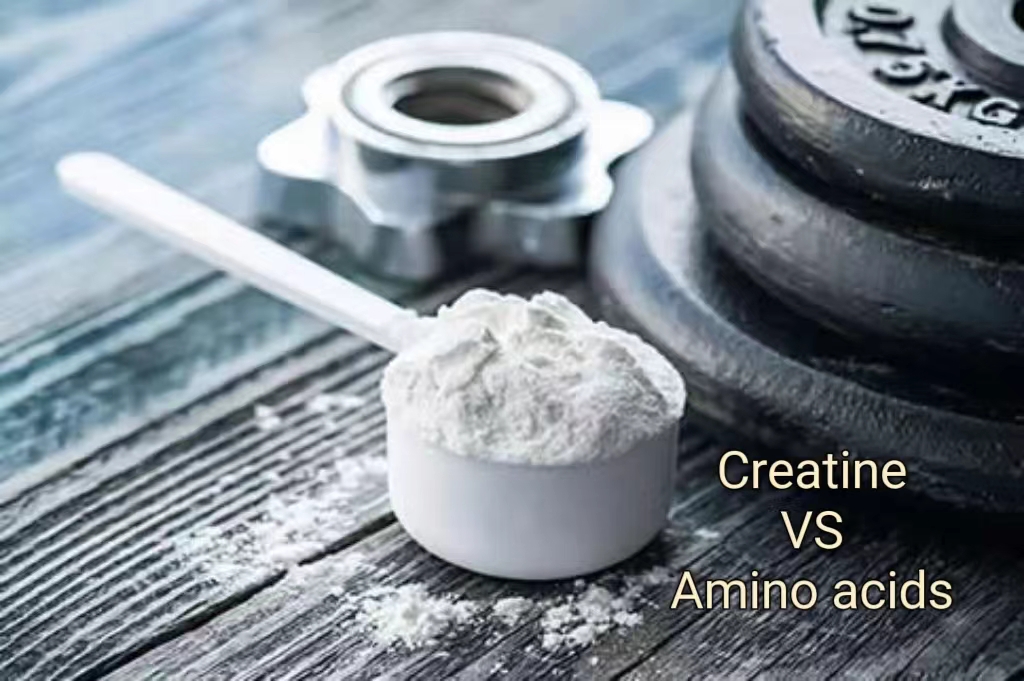
When exercising, many people supplement nutrients, mostly creatine and amino acids. So, which one is more suitable for fitness enthusiasts? The following will introduce the differences between the two.

Source:
* The human body can synthesize creatine. It is synthesized in the liver, kidneys, and pancreas from arginine, glycine, and methionine precursors. This process is part of the human body's natural formation of amino acid derivatives. On the other hand, creatine can also be obtained from food or supplements. It is mainly found in meat and fish, making these foods important sources of creatine for the body.
* Amino acids mainly come from the following sources:
1. Digestion and absorption of protein in food. Proteins in food are broken down into amino acids during digestion, which are then absorbed and utilized by the body.
2. The body can synthesize some non-essential amino acids for maintaining life activities.
3. Breakdown of tissue proteins. Tissue proteins within cells can be broken down into amino acids, which can be further converted into energy or used for synthesizing other biomolecules.
4. Amino acids can also be produced in the body through transamination reactions.
Molecular weight:
* Creatine is a nitrogenous organic acid with the chemical formula C4H9N3O2, known as N-methylguanidoacetic acid. It naturally occurs in vertebrates and helps provide energy for muscles and nerve cells.
* The molecular weight of amino acids varies depending on the type, usually ranging from 50 to 500. Among the 20 naturally occurring amino acids, the molecular weight generally falls between 70 and 150. Specifically, among the essential amino acids, tryptophan has the highest molecular weight at 204.22, while glycine has the lowest at 75.05. Additionally, the molecular weight of amino acids is composed of the molecular weights of the core amino acid molecule, the R group, and the polar tail molecule, each of which has a different molecular weight range, leading to variations in the overall molecular weight of amino acids.
Function:
* Creatine
1. Creatine can create energy: Creatine can be rapidly synthesized to produce adenosine triphosphate, an essential substance in human metabolism that provides energy.
2. Creatine can promote muscle growth and endurance: Creatine synthesis of adenosine triphosphate improves muscle strength and endurance, helping athletes exercise muscles.
3. Suitable for adjunctive therapy in patients with muscle wasting: Creatine can also be used in patients with muscle wasting.
* Amino acids
1. Synthesis of structural proteins
Protein is an essential nutrient for the human body in various foods. After consuming high-protein foods, the protein cannot be directly utilized by the body and needs to be converted into amino acids, which can then be used. Therefore, the digestion and absorption of protein in the human body require amino acids to complete, thereby synthesizing tissue proteins.
2. Maintain normal metabolism of the body
Amino acids can be converted into substances containing ammonia, such as acids, hormones, antibodies, and creatine. They play an essential role in regulating physiological functions and catalyzing metabolic processes, helping to maintain normal metabolism in the body.
3. Improve the body's immune system
Amino acids are essential nutrients for the human body, accelerating the synthesis of immunoglobulins and enhancing immunity.
4. Generating energy
Amino acids can be converted into carbohydrates, and fats oxidized into carbon dioxide, water, and urea, providing energy for the body.
5. Amino acids have many functions, and in medicine, they can also be used to prepare compound amino acid injections as clinical nutritional support.
Absorption speed:
* Creatine is absorbed relatively quickly. In general, creatine can be absorbed and stored in the muscles within 30 minutes.
* Amino acids must be broken down into individual molecules by the digestive system before they can be absorbed and utilized.
Target Audience:
* Creatine is beneficial for people engaged in long-term exercise.
* Amino acids are suitable for people with inadequate protein intake, renal insufficiency, postoperative recovery, and weakened immune systems.
In conclusion, creatine is more suitable for fitness enthusiasts, but amino acids also have benefits. It all depends on your specific needs. My article has been helpful to you.
 Magnesium Glycinate VS Citrate
Magnesium Glycinate VS Citrate